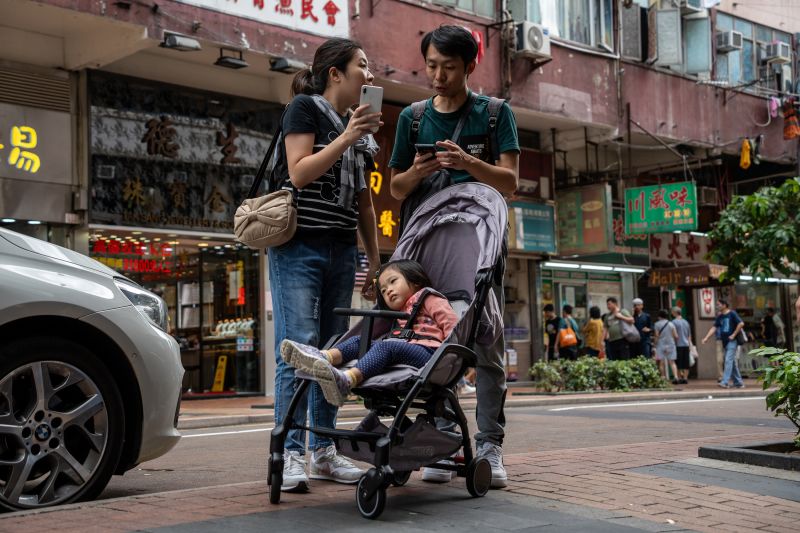
This city is paying new parents $2,500 for having a baby – and that won’t even pay a month’s rent
Hong Kong is to pay new parents more than $2,500 for having a baby in a bid to boost its flagging birth rate, but many residents in the notoriously expensive city say it’s barely enough to cover a month’s rent.
Hong Kong Chief Executive John Lee Ka-chiu announced the move during his annual policy address on Wednesday, saying there would be a handout of HK$20,000 ($2,556) to the parents of each baby born from now until 2026 in an effort to lift the city’s “persistently low birth rate” – which has plunged to a record low of 0.9 births per woman, well below the 2.1 needed to ensure a stable population.
“Childbearing is a major life decision involving many considerations,” Lee said as he unveiled a series of financial measures that also included a move to slash home buyers’ stamp duty from 15% to 7.5%.
The handout comes on top of existing tax incentives for new parents, who receive annual tax deductions for each child, with an extra deduction for newborns.
While the handout might seem generous, it falls short of some of the incentives on offer in other countries in East Asia also struggling with low birth rates.
Singapore (birth rate: 1.05) offers a $8,036 handout for both the first and second child and $9,497 for the third child, alongside four weeks of paternity leave (up to 16 weeks for maternity), unpaid infant care leave and tax relief for working mothers.
South Korea (birth rate 0.78) currently hands out $518 per month until the child reaches one year old, with that figure expected to rise to $740 next year.
In Japan (birth rate 1.3), parents get a monthly allowance of $107 dollars for each newborn until two years of age. For each child between three years old and senior high, parents get $66.7 per month.
1 month’s rent, 3 months’ nursery
“It can’t even cover one month of my mortgage, as well as the gas and electricity bills,” said Ken Lau, a father of one who is contemplating a second child, shortly after the measure was announced.
“How about one handout per year?” said Kristy Chan, a mother with one daughter who said the move would do little to change her mind about having a second child.
According to Midland Realty, a real estate agency in Hong Kong, the average monthly rent for a 500-square-foot flat with two bedrooms in the city is about $2,253 this year, which would gobble up more than 90% of the cash the government is going to hand out.
With home prices among the most expensive in the world (a flat of similar size can easily fetch up to $1.3 million), high interest rates and rising living expenses for products like infant formula and diapers, many couples feel too burdened to contemplate having babies.
“For those who know how to do the maths, they know this is not working,” Lau said.
Full-time mother Kim Yeung, who has made up her mind not to have a second child, says the handout would cover roughly three months’ nursery fees for her 2-year-old son, based on the average cost of $766. Top nurseries can cost more than double that, she added.
Hong Kong subsidizes education from kindergarten to senior high, but nursery, the year or two before kindergarten, is not usually covered.
In Hong Kong and other Chinese cities it is also common to hire a confinement nanny (or “pui yuet”) for the first month to cook meals and do chores while the new mother is recovering from giving birth. Again, the government payout wouldn’t go far.
“Hiring a confinement nanny would have already cost the entirety of $2,556,” Yeung said.
The bigger picture
Professor Paul Yip Siu-fai, who studies population health at the University of Hong Kong, said a one-off cash handout wouldn’t address parents’ longer term financial concerns.
“There are three parts to consider when giving birth to a child, that is, the actual part of giving birth, then raising them, and then educating them,” he said.
He said Hong Kong needed to do more to help parents in the second two stages, such as encouraging parent-friendly office environments that, for instance, offer flexible shift patterns.
“Childbirth should not just be a matter for the parents. It should be a responsibility shared by society,” Yip said.
Sze Lai-shan, deputy director of the Society for Community Organization, a NGO that serves some of the city’s poorest, said many people on lower incomes faced an impossible choice as they could not afford childcare but also could not afford to take time off work to look after their child.
The Hong Kong government also pledged to speed up access to public housing for families with children and bump up the capacity of public child care services, though Sze said this was not enough.
She called on the government to provide housing allowances as well as subsidies for nurseries to make daytime childcare services more accessible.
Lau, the father of one, agreed, urging the government also to extend paternity and maternity leave.
“For those who want to give birth, they are not doing it because of HK$20,000. And for those who see financial conditions as a hurdle, they are not going to change their mind just because of HK$20,000,” he said.
“The government should be thinking about how to convince [us] that Hong Kong is conducive to child-raising,” Lau said.
